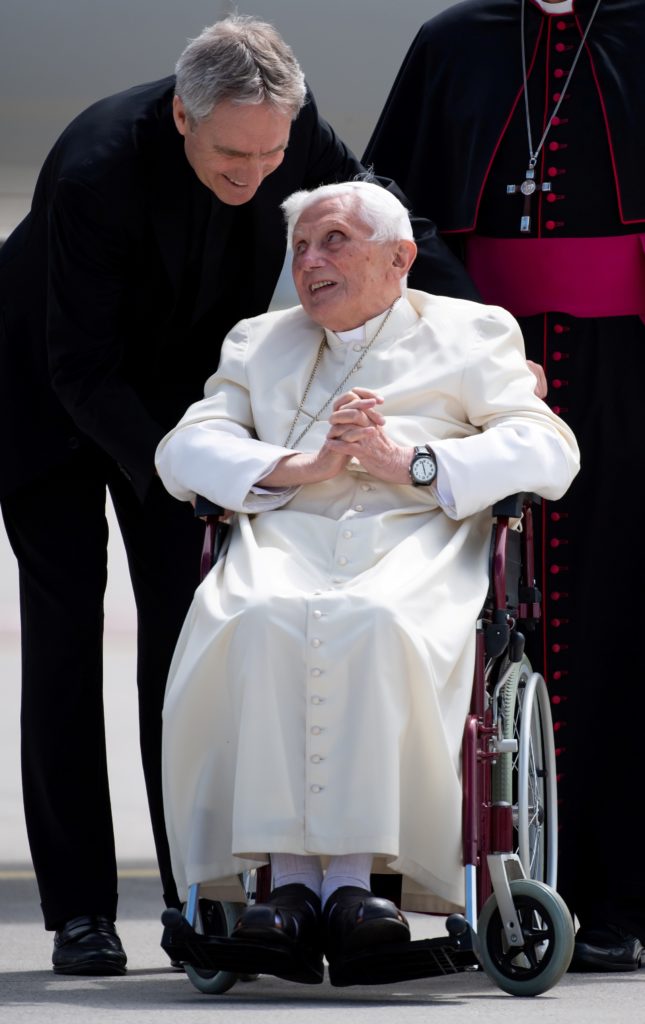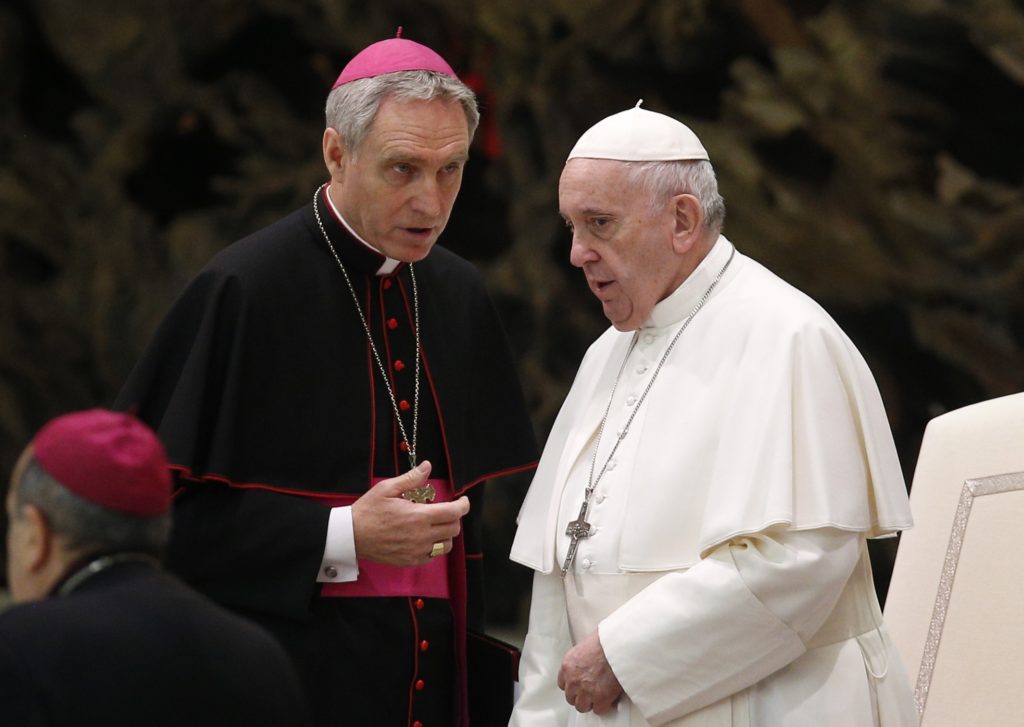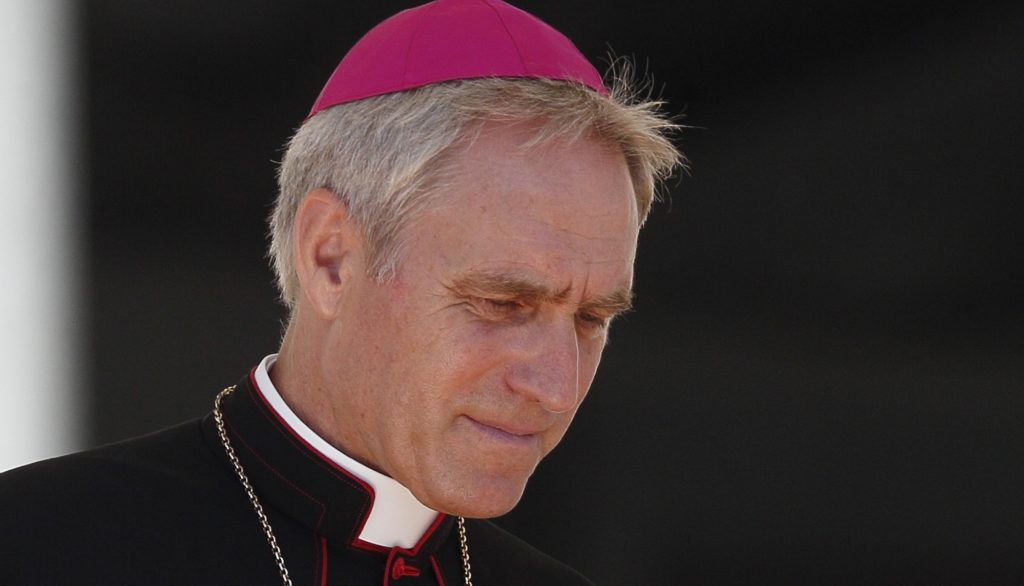On the occasion of the publication of his latest book "How the Catholic Church Can Restore Our Culture," we spoke with Msgr. Georg Gänswein, Prefect of the Pontifical Household, on various topics, from the "de-worldization" of the Church to Benedict XVI's prayer intentions and his views on the evolution of the Church in Germany.
The singularity of Gänswein's task in the Holy See is well known, as the only person who works daily with two Popes. He is, on the one hand, the Prefect of the Pontifical Household, and in that capacity, among other matters, he is in charge of organizing the solemn audiences that Pope Francis grants to heads of state, presidents of governments, ministers and other personalities. He is also in charge of preparing private audiences and pontifical ceremonies. In addition, Gänswein continues to work as private secretary to Pope Emeritus Benedict XVI, also after his resignation, for almost twenty years.
The prayer of Benedict XVI
We asked him about the personal prayer of Pope Emeritus Benedict XVI and Gänswein affirms: "Benedict XVI's prayer life is very personal, intimate and hidden from the eyes of others. He prays the Divine Office, like all priests".
Book

In this regard, in an interview included in the book that is now published, he said of Benedict XVI that "his daily routine is simple. It begins with Holy Mass in the morning. From time to time I concelebrate. After that the breviary, then breakfast. The morning has the following rhythm: prayer, reading, correspondence, visits." In the afternoon, the Pope emeritus rests for a while, and spends time reading and answering letters and mail.

We are interested in Benedict XVI's correspondence. Gänswein explains that Benedict XVI "continually receives in his correspondence the requests of people who ask for his intercession in prayer, to which he willingly entrusts himself". He prays the rosary, and after dinner watches the Italian news. "On Sunday he has a different routine: there is no work, but there is music and culture."
On Palm Sunday we were able to see an image of the Pope Emeritus celebrating the Eucharist with his personal secretary.
During the conversation with Omnes, Gänswein said that Benedict XVI includes in his prayer a particular petition "for the intentions of the universal Church and for the ministry of his successor Pope Francis."
Benedict XVI prays particularly for the intentions of the universal Church and for the ministry of his successor Pope Francis.
Georg GänsweinPrefect of the Pontifical Household and Personal Secretary to Benedict XVI
Perspective on Germany
Naturally, Gänswein follows church life in Germany closely. He states that he follows with "sympathy, interest and also apprehension the evolution of ecclesiastical life in my homeland". In addition to the information that, as a German prelate, he receives in abundance, his perspective is enriched by the position he occupies in the heart of the Church. Indeed, he confirms that "observed from afar, from the center of Catholicism, the situation can present lights and shadows that can escape those who observe directly from their own place".
Specifically, he finds lights and shadows in the process called "Synodal Way" that began in Germany in 2019 at the urging of the Bishops' Conference in collaboration with the Central Committee of Catholics. He warns that "the Synodal Way, which began almost two years ago, has revealed problems and shortcomings regarding the authenticity of the faith and the pronouncements of the hierarchy, along with some positive aspects."
For this reason, he warns of the possible frustration that could result from making demands that cannot be met. Indeed, "there is a risk that in the end there will be a feeling of disappointment because certain aspirations have not been met.
The German synodal journey has revealed problems and shortcomings concerning the authenticity of the faith and the pronouncements of the hierarchy, along with some positive aspects.
Georg GänsweinPrefect of the Pontifical Household and Personal Secretary to Benedict XVI
Facing a secularized society
"Christians live in the world and are called to serve the world and work in it. But they are not to be content with it". This is how Georg Gänswein expressed himself in the inaugural lecture of the academic year of the Philosophical-Theological University Heiligenkreuz Benedict XVI in 2015. With that diagnosis in mind, inspired by Benedict XVI's famous speech in the Freiburg Concert Hall during the apostolic journey to Germany in 2011, we wanted to ask him his opinion on the matter.
"The Church," he tells us, "must take extreme and particular care not to lose the direction of her action in the world, in fidelity to the Gospel, which is fidelity to God. Its secularization does not correspond to the mandate of the Master, who invited it to be in the world but not to be of the world".

However, she clarifies that this "unworldliness" does not imply alienation: "It does not mean at all that it should be separated from the world, entrenched in the defense of a separate citadel that lives from ecclesiastical and clerical structures". It affirms that "it is inserted in the history of humanity and animates it with the essence of the Gospel for the creation, already here, of the Kingdom of God".
The role of the laity
In the Church, "obviously, each member has his own prerogatives and competencies". We asked him if he did not think that more Catholics should be involved in politics and contribute to legislation that respects human dignity, within the diversity of options and the freedom of each individual. He answers that indeed "it is opportune for [the Church] to form committed lay people who, animated by the spirit of the Gospel, take an active part in political and social life to contribute to a more just and reconciled world, and to be the architects of creative responses to the challenges of the world".
In the book recently published by Ediciones Rialp, Bishop Gänswein deals with these and other questions of interest to the Church and to Christians. His pages present his considerations on the state of the Church and its most probable future in an increasingly secular society. He does so through the nineteen speeches compiled in this volume.
Your new book
By courtesy of Ediciones Rialp, publisher of Bishop Gänswein's new book "How the Catholic Church Can Restore Our Culture," the reader of this issue of Omnes you can download chapter 13 "Europe's past and future. What Europe can learn from its Roman past.".








